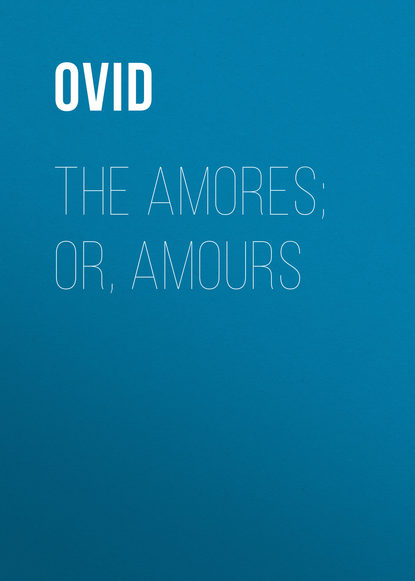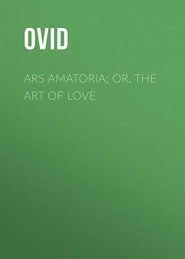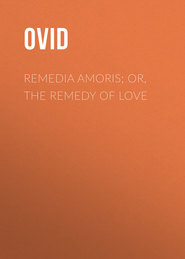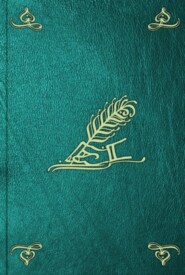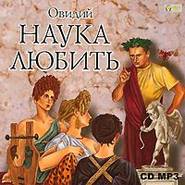По всем вопросам обращайтесь на: info@litportal.ru
(©) 2003-2024.
✖
The Amores; or, Amours
Настройки чтения
Размер шрифта
Высота строк
Поля
[ Mars in opposition.—Ver. 29. She is dabbling here in astrology, and the adverse and favourable aspects of the stars. We are to suppose that she is the agent of the young man who has seen the damsel, and she is telling her that the rising star of Venus is about to bring her good luck.]
107 (return (#x2_x_2_i4))
[ Makes it his care.—Ver. 32. Burmann thinks that this line, as it stands at present, is not pure Latin; and, indeed, 'curæ habet,' 'makes it his care,' seems a very unusual mode of expression. He suggests another reading—'et, cultæ quod tibi défit, habet,' 'and he possesses that which is wanting for your being well-dressed,' namely, money.]
108 (return (#x2_x_2_i5))
[ The damsel blushed.—Ver. 35. He says that his mistress blusned at the remark of the old hag, that the young man was worthy to be purchased by her, if he had not been the first to make an offer. We must suppose that here the Poet peeped through a chink of the door, as he was on the other side, listening to the discourse; or he may have reasonably guessed that she did so, from the remark made in the same line by the old woman.]
109 (return (#x2_x_2_i5))
[ Your eyes cast down.—Ver. 37. The old woman seems to be advising her to pretend modesty, by looking down on her lap, so as not to give away even a look, until she has seen what is deposited there, and then only to give gracious glances in proportion to her present. It was the custom for the young simpletons who lavished their money on the Roman courtesans, to place their presents in the lap or bosom.]
111 (return (#x2_x_2_i5))
[ Sabine females.—Ver. 39. The Sabines were noted for their domestic virtues. The hag hints, that the chastity of the Sabine women was only the result of their want of good breeding. 'Tatio régnante' seems to point to the good old times, in the same way as our old songsters have it, 'When good king Arthur reigned.' Tatius reigned jointly at Rome with Romulus. See the Fourteenth Book of the Metamorphoses, 1. 804.]
112 (return (#x2_x_2_i5))
[ In foreign warfare.—Ver. 41. She says, that they are now in a more civilized state, than when they were fighting just without the walls of Rome; now they are solely engaged in foreign conquests, and Venus reigns in the city of the descendants of her son, Æneas.]
113 (return (#x2_x_2_i5))
[ Dispel these frowns.—Ver. 45. The damsel has, probably, frowned here at her last remark, on which she tells her she must learn to dispense with these frowns, and that when she dispels them, 'excutit,' so many faults which might otherwise prove to her disadvantage, will be well got rid of.]
114 (return (#x2_x_2_i5))
[ Penelope used to try.—Ver. 47. Penelope, in order that she might escape the importunity of the suitors, proposed that they should try to bend the bow of Ulysses, promising her hand to him who should prove successful. The hag, however, says that, with all her pretended chastity, Penelope only wanted to find out who was the most stalwart man among her lovers, in order that she might choose him for a husbaud.]
116 (return (#x2_x_2_i6))
[ Graceful in his mantle.—Ver. 59. The 'palla' was especially worn by musicians. She is supposed to refer to the statue of Apollo, which was erected on the Palatine Hill by Augustus; and her design seems to be, to shew that poetry and riches are not so incompatible as the girl may, from her lover's poverty, be led to imagine.]
117 (return (#x2_x_2_i6))
[ At a price for his person.—Ver. 63. That is to say, some rich slave who has bought his own liberty. As many of the Roman slaves were skilful at various trades and handicrafts, and were probably allowed the profits of their work after certain hours in the day, it would be no uncommon thing for a slave, with his earnings, to purchase his liberty. Some of the slaves practised as physicians, while others followed the occupation of literary men.]
118 (return (#x2_x_2_i6))
[ Rubbed with chalk.—Ver. 64. It was the custom to mark with chalk, 'gypsum,' the feet of such slaves as were newly imported for sale.]
119 (return (#x2_x_2_i6))
[ Busts about the halls.—Ver. 65. Instead of 'quinquatria,' which is evidently a corrupt reading, 'circum atria' has been adopted. She is advising the girl not to be led away by notions of nobility, founded on the number of 'ceræ,' or waxen busts of their ancestors, that adorned the 'atria,' or halls of her admirers. See the Fasti, Book i. line 591, and the Note to the passage; also the Epistle of Laodamia to Protesilaus, line 152.]
120 (return (#x2_x_2_i6))
[ Nay, more, should.—Ver. 67. 'Quin' seems to be a preferable reading to-'quid?']
121 (return (#x2_x_2_i7))
[ There will be Isis.—Ver. 74. The Roman women celebrated the festival of Isis for several successive days, and during that period they care-fully abstained from the society of men.]
127 (return (#x2_x_2_i7))
[ By your censure.—Ver. 80. When she has offended she is to pretend a counter grievance, so as to outweigh her faults.]
128 (return (#x2_x_2_i7))
[ A deaf hearing.—Ver. 86. Literally, 'deaf Godhead.']
129 (return (#x2_x_2_i8))
[ A crafty handmaid.—Ver. 87. The comedies of Plautus and Terence show the part which the intriguing slaves and handmaids acted on such occasions.]
130 (return (#x2_x_2_i8))
[ A little of many.—Ver. 89. 'Multos,' as suggested by Heinsius, is preferable to 'multi,' which does not suit the sense.]
131 (return (#x2_x_2_i8))
[ Heap from the gleanings—Ver. 90. 'Stipula' here means 'gleanings.' She says, that each of the servants must ask for a little, and those little sums put together will make a decent amount collected from her lovers. No doubt her meaning is, that the mistress should pocket the presents thus made to the slaves.]
132 (return (#x2_x_2_i8))
[ With a cake.—Ver. 94. The old woman tells how, when she has exhausted all other excuses for getting a present, to have the birth-day cake by her, and to pretend that it is her birth-day; in order that her lover may take the hint, and present her with a gift. The birth-day cake, according to Servius, was made of flour and honey; and being set on tabic before the guests, the person whose birth-day it was, ate the first slice, after which the others partook of it, and wished him happiness and prosperity. Presents, too, were generally made on birth-days.]
133 (return (#x2_x_2_i8))
[ The Sacred Street."—Ver. 100. The 'via sacra,' or' Sacred Street, from the old Senate house at Rome towards the Amphitheatre, and up the Capitoline hill. For the sale of all kinds of luxuries, it seems to have had the same rank in Rome that Regent Street holds in London. The procuress tells her, that if her admirer makes no presents, she must turn the conversation to the 'Via Sacra;' of course, asking him such questions as, What is to be bought there? What is the price of such and such a thing? And then she is to say, that she is in want of this or that, but unfortunately she has no money, &c.]
134 (return (#x2_x_2_i8))
[ Conceal your thoughts.—Ver. 103. This expression resembles the famous one attributed to Machiavelli, that 'speech was made for the concealment of the thoughts.']
[ Prove his ruin.—Ver. 103. 'Let your lips utter kind things, but let it be your intention to ruin him outright by your extravagance.']
135 (return (#x2_x_2_i8))
[ Grant thee both no home—Ver. 113. The 'Lares,' being the household Gods, 'nullos Lares,' implies 'no home.']
136 (return (#x2_x_2_i9))
[ Everlasting thirst.—Ver. 114. In allusion to her thirsty name; see the Note to the second line.]
138 (return (#x2_x_2_i13))
[ Atticus.—Ver. 2. It is supposed that this Atticus was the same person to whom Ovid addresses the Fourth and Seventh Pontic Epistle in the Second Book. It certainly was not Pomponius Atticus, the friend of Cicero, who died when the Poet was in his eleventh year.]
107 (return (#x2_x_2_i4))
[ Makes it his care.—Ver. 32. Burmann thinks that this line, as it stands at present, is not pure Latin; and, indeed, 'curæ habet,' 'makes it his care,' seems a very unusual mode of expression. He suggests another reading—'et, cultæ quod tibi défit, habet,' 'and he possesses that which is wanting for your being well-dressed,' namely, money.]
108 (return (#x2_x_2_i5))
[ The damsel blushed.—Ver. 35. He says that his mistress blusned at the remark of the old hag, that the young man was worthy to be purchased by her, if he had not been the first to make an offer. We must suppose that here the Poet peeped through a chink of the door, as he was on the other side, listening to the discourse; or he may have reasonably guessed that she did so, from the remark made in the same line by the old woman.]
109 (return (#x2_x_2_i5))
[ Your eyes cast down.—Ver. 37. The old woman seems to be advising her to pretend modesty, by looking down on her lap, so as not to give away even a look, until she has seen what is deposited there, and then only to give gracious glances in proportion to her present. It was the custom for the young simpletons who lavished their money on the Roman courtesans, to place their presents in the lap or bosom.]
111 (return (#x2_x_2_i5))
[ Sabine females.—Ver. 39. The Sabines were noted for their domestic virtues. The hag hints, that the chastity of the Sabine women was only the result of their want of good breeding. 'Tatio régnante' seems to point to the good old times, in the same way as our old songsters have it, 'When good king Arthur reigned.' Tatius reigned jointly at Rome with Romulus. See the Fourteenth Book of the Metamorphoses, 1. 804.]
112 (return (#x2_x_2_i5))
[ In foreign warfare.—Ver. 41. She says, that they are now in a more civilized state, than when they were fighting just without the walls of Rome; now they are solely engaged in foreign conquests, and Venus reigns in the city of the descendants of her son, Æneas.]
113 (return (#x2_x_2_i5))
[ Dispel these frowns.—Ver. 45. The damsel has, probably, frowned here at her last remark, on which she tells her she must learn to dispense with these frowns, and that when she dispels them, 'excutit,' so many faults which might otherwise prove to her disadvantage, will be well got rid of.]
114 (return (#x2_x_2_i5))
[ Penelope used to try.—Ver. 47. Penelope, in order that she might escape the importunity of the suitors, proposed that they should try to bend the bow of Ulysses, promising her hand to him who should prove successful. The hag, however, says that, with all her pretended chastity, Penelope only wanted to find out who was the most stalwart man among her lovers, in order that she might choose him for a husbaud.]
116 (return (#x2_x_2_i6))
[ Graceful in his mantle.—Ver. 59. The 'palla' was especially worn by musicians. She is supposed to refer to the statue of Apollo, which was erected on the Palatine Hill by Augustus; and her design seems to be, to shew that poetry and riches are not so incompatible as the girl may, from her lover's poverty, be led to imagine.]
117 (return (#x2_x_2_i6))
[ At a price for his person.—Ver. 63. That is to say, some rich slave who has bought his own liberty. As many of the Roman slaves were skilful at various trades and handicrafts, and were probably allowed the profits of their work after certain hours in the day, it would be no uncommon thing for a slave, with his earnings, to purchase his liberty. Some of the slaves practised as physicians, while others followed the occupation of literary men.]
118 (return (#x2_x_2_i6))
[ Rubbed with chalk.—Ver. 64. It was the custom to mark with chalk, 'gypsum,' the feet of such slaves as were newly imported for sale.]
119 (return (#x2_x_2_i6))
[ Busts about the halls.—Ver. 65. Instead of 'quinquatria,' which is evidently a corrupt reading, 'circum atria' has been adopted. She is advising the girl not to be led away by notions of nobility, founded on the number of 'ceræ,' or waxen busts of their ancestors, that adorned the 'atria,' or halls of her admirers. See the Fasti, Book i. line 591, and the Note to the passage; also the Epistle of Laodamia to Protesilaus, line 152.]
120 (return (#x2_x_2_i6))
[ Nay, more, should.—Ver. 67. 'Quin' seems to be a preferable reading to-'quid?']
121 (return (#x2_x_2_i7))
[ There will be Isis.—Ver. 74. The Roman women celebrated the festival of Isis for several successive days, and during that period they care-fully abstained from the society of men.]
127 (return (#x2_x_2_i7))
[ By your censure.—Ver. 80. When she has offended she is to pretend a counter grievance, so as to outweigh her faults.]
128 (return (#x2_x_2_i7))
[ A deaf hearing.—Ver. 86. Literally, 'deaf Godhead.']
129 (return (#x2_x_2_i8))
[ A crafty handmaid.—Ver. 87. The comedies of Plautus and Terence show the part which the intriguing slaves and handmaids acted on such occasions.]
130 (return (#x2_x_2_i8))
[ A little of many.—Ver. 89. 'Multos,' as suggested by Heinsius, is preferable to 'multi,' which does not suit the sense.]
131 (return (#x2_x_2_i8))
[ Heap from the gleanings—Ver. 90. 'Stipula' here means 'gleanings.' She says, that each of the servants must ask for a little, and those little sums put together will make a decent amount collected from her lovers. No doubt her meaning is, that the mistress should pocket the presents thus made to the slaves.]
132 (return (#x2_x_2_i8))
[ With a cake.—Ver. 94. The old woman tells how, when she has exhausted all other excuses for getting a present, to have the birth-day cake by her, and to pretend that it is her birth-day; in order that her lover may take the hint, and present her with a gift. The birth-day cake, according to Servius, was made of flour and honey; and being set on tabic before the guests, the person whose birth-day it was, ate the first slice, after which the others partook of it, and wished him happiness and prosperity. Presents, too, were generally made on birth-days.]
133 (return (#x2_x_2_i8))
[ The Sacred Street."—Ver. 100. The 'via sacra,' or' Sacred Street, from the old Senate house at Rome towards the Amphitheatre, and up the Capitoline hill. For the sale of all kinds of luxuries, it seems to have had the same rank in Rome that Regent Street holds in London. The procuress tells her, that if her admirer makes no presents, she must turn the conversation to the 'Via Sacra;' of course, asking him such questions as, What is to be bought there? What is the price of such and such a thing? And then she is to say, that she is in want of this or that, but unfortunately she has no money, &c.]
134 (return (#x2_x_2_i8))
[ Conceal your thoughts.—Ver. 103. This expression resembles the famous one attributed to Machiavelli, that 'speech was made for the concealment of the thoughts.']
[ Prove his ruin.—Ver. 103. 'Let your lips utter kind things, but let it be your intention to ruin him outright by your extravagance.']
135 (return (#x2_x_2_i8))
[ Grant thee both no home—Ver. 113. The 'Lares,' being the household Gods, 'nullos Lares,' implies 'no home.']
136 (return (#x2_x_2_i9))
[ Everlasting thirst.—Ver. 114. In allusion to her thirsty name; see the Note to the second line.]
138 (return (#x2_x_2_i13))
[ Atticus.—Ver. 2. It is supposed that this Atticus was the same person to whom Ovid addresses the Fourth and Seventh Pontic Epistle in the Second Book. It certainly was not Pomponius Atticus, the friend of Cicero, who died when the Poet was in his eleventh year.]





